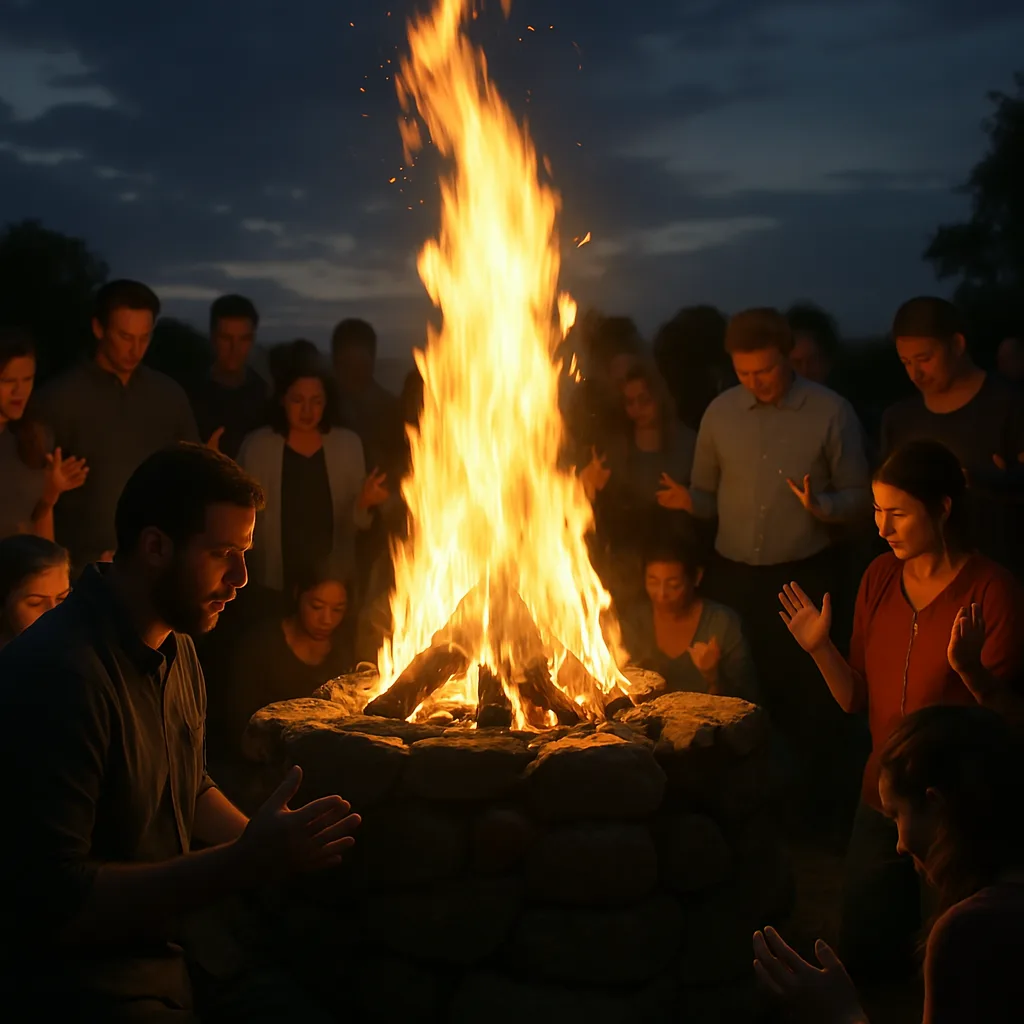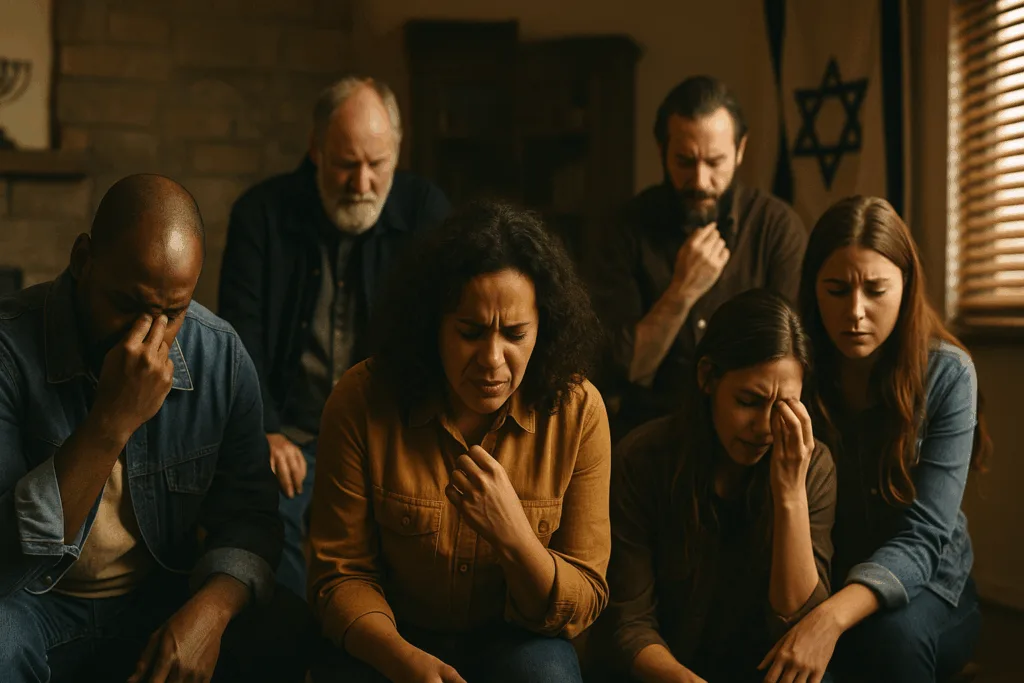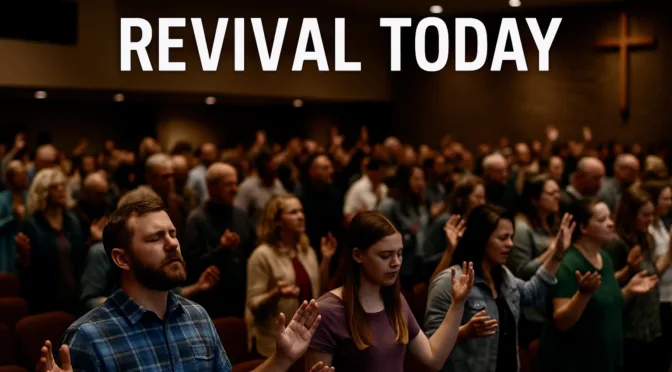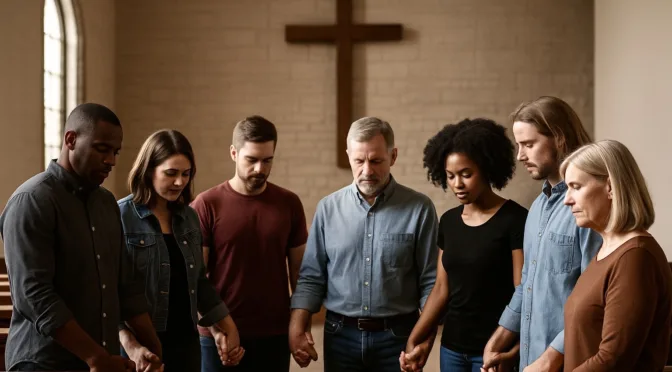A Call to Unity in the Body of Christ
Beloved, we must return to what is written. The body of Messiah is not divided, though we have made it so. We build walls of preference and call them doctrine. We form camps and name them after men. Some say, “I follow Paul,” and others, “I follow Apollos,” or “I follow Cephas,” or even, “I follow Christ.” But the Apostle cries out to the Corinthian church—and to us—“Has Christ been divided?” (1 Corinthians 1:12–13, NASB). The Gospel was never meant to be fractured. The cross was not split in pieces. The blood of Yeshua was poured out for one Bride, one Body, one eternal covenant people.
Yet we gather under banners that exalt style, tradition, and personality instead of exalting the Lamb. We have preferred comfort to consecration, familiarity to fellowship, and our stream to the fullness of the river. But the Spirit of the Lord calls out even now: There is one body and one Spirit, just as also you were called in one hope of your calling; one Lord, one faith, one baptism, one God and Father of all who is over all and through all and in all(Ephesians 4:4–6, NASB).
This is not a call to shallow compromise. It is a call to holy alignment. Unity does not mean erasing the truth. Unity means we bow to the truth together. We submit not to each other’s opinions but to the Word of God, which remains forever. The Gospel is not about what we prefer. It is about what God has declared. It is time to return to the authority of Scripture, the Lordship of Yeshua, and the fellowship of the Spirit.
Yeshua is walking among the lampstands (Revelation 1:12–13). He sees every church, every pulpit, every prayer meeting. His eyes are like flames of fire, and He is examining the heart of His Bride. What does He find? Division? Competition? Suspicion? We are quick to judge others who do not worship like us, pray like us, teach like us—but are we so sure we are the standard? Beloved, the standard is Yeshua. And He is calling for oneness—not sameness, but unity born of the Spirit.
Before He went to the cross, our Lord prayed: “I am not asking on behalf of these alone, but also for those who believe in Me through their word, that they may all be one; just as You, Father, are in Me, and I in You, that they also may be in Us, so that the world may believe that You sent Me” (John 17:20–21, NASB). This is not a secondary issue. Our oneness is part of our witness. A divided Church cannot reveal a united Savior.
And yet, even now, revival is knocking. The Spirit is brooding over the deep waters again. But revival will not rest on a scattered Bride. It will rest where there is repentance, humility, and unity. It will rest on a people who say, “Not to us, O LORD, not to us, but to Your name give glory” (Psalm 115:1, NASB). Revival begins when the Church stops building its own towers and begins rebuilding the altar. It begins when we gather not around personalities, but around the Person of Yeshua.
Let us tear down the walls. Let the elders reach across the aisle. Let pastors seek each other out. Let worshipers find common ground in the holiness of God. Let the Church be one again. The hour is late. The return of the King is near. He is not coming for many brides—He is coming for one. He is not coming for denominations—He is coming for disciples.
And so we cry out: Come, Lord Yeshua. Find us ready. One heart. One voice. One faith. One Bride made pure by Your Word.

Prayer:
Abba Father, we come before You as one people in need of mercy. Forgive us for building altars to men instead of laying ourselves down at Yours. We have divided where You have called us to unite, we have exalted our streams above Your river, and we have guarded our preferences more fiercely than Your Word.
But today we turn. Today we lay down our pride, our names, our camps. We cry out for the unity that only comes by Your Spirit. Make us one, O God, even as You and Yeshua are One. Let the walls crumble. Let the fire fall. Let the sound of true repentance rise from every corner of Your Church.
Walk among us again, King of Glory. Speak to every lampstand. Revive what is dying. Rebuke what is false. Restore what has been broken. We long for the day when every tongue will confess that Yeshua is Lord. Until then, let us live as one body—holy, pure, and waiting for the sound of the trumpet.
In the name of the Lamb who was slain and lives forever,
Amen.
O Shepherd of the scattered fold, gather now Your holy flame,
Call the tribes from every land, one Bride to bear Your name.
No more boasting, no more pride, no more thrones of man,
Let Your Word be lifted high across the broken span.
In the fire of Your presence, melt our hearts as one—
Until all the Church together cries, “Come, Lord Yeshua, come!”
See Also
- When the Church becomes One again
- The Church Is God’s Dwelling Place
- Revival: What We Can Learn from Previous Moves
- Christian unity in the Church
- Torn Between Two Thrones

A Vision: When the Lord Comes to Tear Down the Walls
It was not in a cathedral. It was not on a stage. It was in a forgotten upper room in the back of a crumbling church—plaster peeling, carpet torn, a single lightbulb swaying overhead. The world outside mocked their weakness. Even other believers had stopped attending. But inside, seven saints knelt on the floor, faces to the dust, soaking the threadbare rug with their tears. No agenda. No performance. Just hunger. “Blessed are those who hunger and thirst for righteousness, for they will be satisfied” (Matthew 5:6, NASB).
They whispered no eloquent prayers. They groaned. They wept. They called upon the Name above all names, and they would not rise until He came. “Yet even now,” declares the Lord, “Return to Me with all your heart, and with fasting, weeping, and mourning” (Joel 2:12, NASB). It was not loud, but it was deep—deeper than music, deeper than preaching, deeper than structure. It was desperation.
And then, suddenly, without warning or cue, He came.
Not the Christ of paintings or songs. Not the sanitized Savior we’ve hung on sanctuary walls. This was the King of kings, “clothed with a robe dipped in blood, and His name is called The Word of God” (Revelation 19:13, NASB). His eyes burned like fire. His voice thundered like many waters (Revelation 1:14–15). He did not knock. He tore the heavens open (Isaiah 64:1). The room shook violently—but not from earthquake—it was glory.
The walls groaned, trembled, then crumbled. Not just in that upper room, but across the land. Church buildings across cities felt it: pulpits split, stained glass shattered, pride cracked open. The Lord had come—not to decorate—but to overthrow. “See, I am doing something new… I will even make a roadway in the wilderness, rivers in the desert” (Isaiah 43:19, NASB).
What poured in was not chaos, but holiness. Not confusion, but cleansing fire. His feet touched the floor where their tears had fallen, and it turned to gold like the streets of heaven (Revelation 21:21). Their sobs became songs. Their weariness became wings. “Those who wait for the Lord will gain new strength; they will mount up with wings like eagles” (Isaiah 40:31, NASB).
As they looked up, their eyes were opened—and they saw Him walking not only in their midst but among the lampstands of the earth (Revelation 1:13). One lifted hand from the Lord, and across oceans and time zones, house churches caught flame. Sanctuaries became sanctified. Altars were rebuilt. Mega churches fell to their knees. Bishops repented. Teenagers prophesied. Denominational names dissolved in the fire. “The glory of the Lord will be revealed, and all flesh will see it together” (Isaiah 40:5, NASB).
One cry rose from every tongue and tribe: “Worthy is the Lamb!” (Revelation 5:12).
Angels rushed to and fro—reaping, healing, anointing (Hebrews 1:14). Dreams flooded hearts. The sick leapt from hospital beds (Luke 7:22). Families reconciled in living rooms. The fire touched Asia, Africa, Europe, the Americas, islands and prisons. One Spirit. One Body. One Lord. “Until we all attain to the unity of the faith… to a mature man, to the measure of the stature which belongs to the fullness of Christ” (Ephesians 4:13, NASB).
And He smiled—not because they were perfect—but because they were yielded. “To this one I will look, to him who is humble and contrite of spirit, and who trembles at My word”(Isaiah 66:2, NASB).
In the sky, the clouds pulsed with light. The earth itself seemed to bow. Creation groaned—but this time not in pain, but in expectation. “For the anxious longing of the creation waits eagerly for the revealing of the sons of God” (Romans 8:19, NASB). The final harvest had begun. Not a revival of man’s making, but a visitation of the Holy One. Not revival to extend our comforts, but revival to gather the Bride. “Behold, the Judge is standing right at the door” (James 5:9, NASB).
It began not with fanfare, but with tears. Not in crowds, but in a room.
And the sound of that weeping rose like incense (Revelation 5:8)…
Until He came—and everything changed.
Let every heart tremble. Let every church listen.
He is not coming to bless our divisions. He is coming to burn them down.
And when He does, may He find us low… seeking His face… ready.











